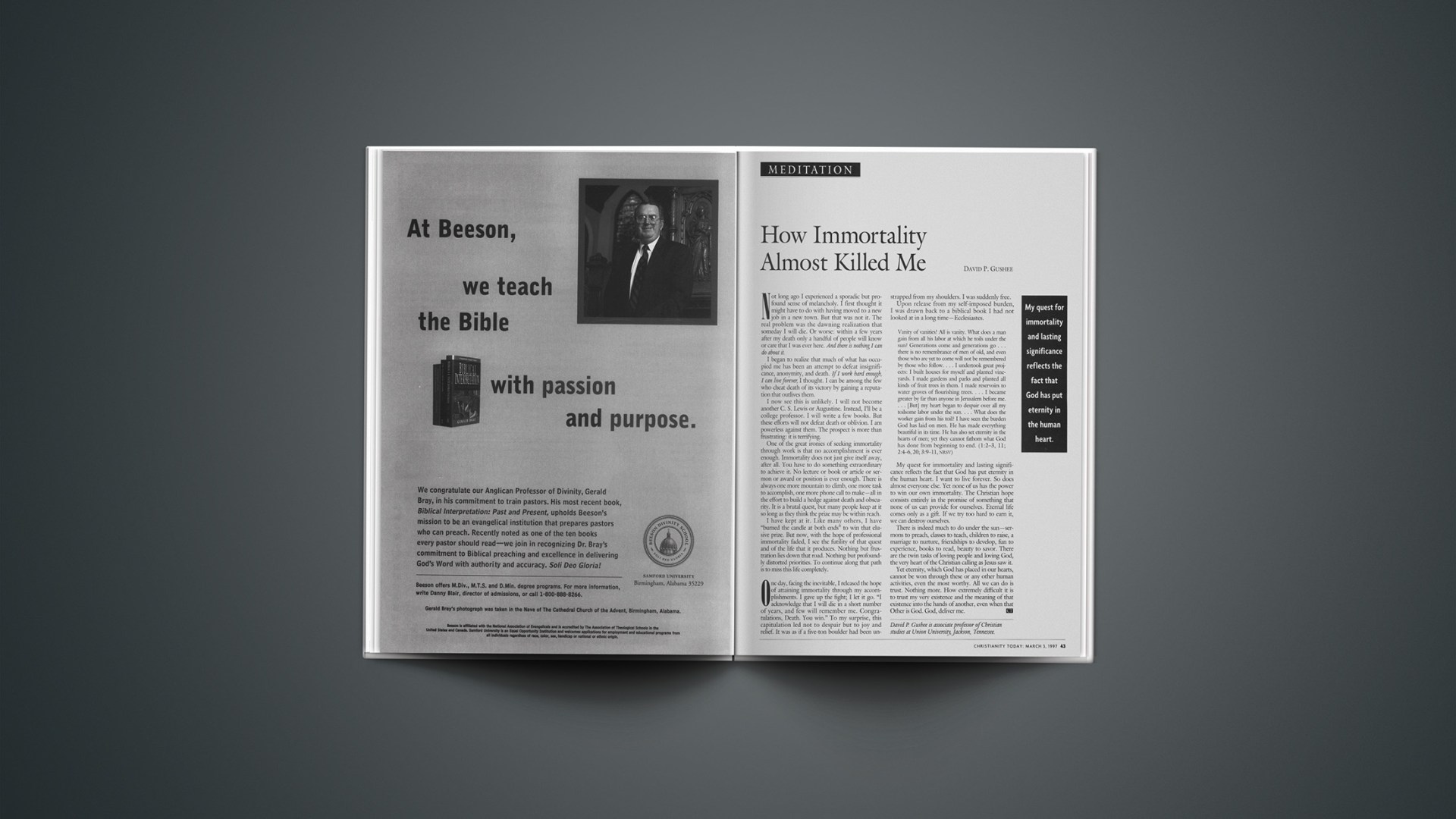Not long ago I experienced a sporadic but profound sense of melancholy. I first thought it might have to do with having moved to a new job in a new town. But that was not it. The real problem was the dawning realization that someday I will die. Or worse: within a few years after my death only a handful of people will know or care that I was ever here. And there is nothing I can do about it.
I began to realize that much of what has occupied me has been an attempt to defeat insignificance, anonymity, and death. If I work hard enough, I can live forever, I thought. I can be among the few who cheat death of its victory by gaining a reputation that outlives them.
I now see this is unlikely. I will not become another C. S. Lewis or Augustine. Instead, I’ll be a college professor. I will write a few books. But these efforts will not defeat death or oblivion. I am powerless against them. The prospect is more than frustrating: it is terrifying.
One of the great ironies of seeking immortality through work is that no accomplishment is ever enough. Immortality does not just give itself away, after all. You have to do something extraordinary to achieve it. No lecture or book or article or sermon or award or position is ever enough. There is always one more mountain to climb, one more task to accomplish, one more phone call to make—all in the effort to build a hedge against death and obscurity. It is a brutal quest, but many people keep at it so long as they think the prize may be within reach.
I have kept at it. Like many others, I have “burned the candle at both ends” to win that elusive prize. But now, with the hope of professional immortality faded, I see the futility of that quest and of the life that it produces. Nothing but frustration lies down that road. Nothing but profoundly distorted priorities. To continue along that path is to miss this life completely.
One day, facing the inevitable, I released the hope of attaining immortality through my accomplishments. I gave up the fight; I let it go. “I acknowledge that I will die in a short number of years, and few will remember me. Congratulations, Death. You win.” To my surprise, this capitulation led not to despair but to joy and relief. It was as if a five-ton boulder had been unstrapped from my shoulders. I was suddenly free.
Upon release from my self-imposed burden, I was drawn back to a biblical book I had not looked at in a long time—Ecclesiastes.
Vanity of vanities! All is vanity. What does a man gain from all his labor at which he toils under the sun? Generations come and generations go … there is no remembrance of men of old, and even those who are yet to come will not be remembered by those who follow. … I undertook great projects: I built houses for myself and planted vineyards. I made gardens and parks and planted all kinds of fruit trees in them. I made reservoirs to water groves of flourishing trees. … I became greater by far than anyone in Jerusalem before me. … [But] my heart began to despair over all my toilsome labor under the sun. … What does the worker gain from his toil? I have seen the burden God has laid on men. He has made everything beautiful in its time. He has also set eternity in the hearts of men; yet they cannot fathom what God has done from beginning to end. (1:2-3, 11; 2:4-6, 20; 3:9-11, NRSV)
My quest for immortality and lasting significance reflects the fact that God has put eternity in the human heart. I want to live forever. So does almost everyone else. Yet none of us has the power to win our own immortality. The Christian hope consists entirely in the promise of something that none of us can provide for ourselves. Eternal life comes only as a gift. If we try too hard to earn it, we can destroy ourselves.
There is indeed much to do under the sun—sermons to preach, classes to teach, children to raise, a marriage to nurture, friendships to develop, fun to experience, books to read, beauty to savor. There are the twin tasks of loving people and loving God, the very heart of the Christian calling as Jesus saw it.
Yet eternity, which God has placed in our hearts, cannot be won through these or any other human activities, even the most worthy. All we can do is trust. Nothing more. How extremely difficult it is to trust my very existence and the meaning of that existence into the hands of another, even when that Other is God. God, deliver me.
-David P. Gushee is associate professor of Christian studies at Union University, Jackson, Tennessee.
Copyright © 1997 Christianity Today. Click for reprint information.










